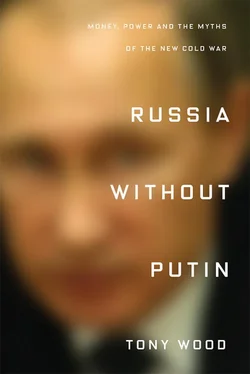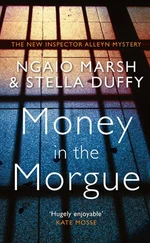Navalnyi has at different times endorsed expressions of chauvinism against both these groups, and against others too. During the 2008 war with Georgia, for example, he called for cruise missiles to be rained down on that country and referred to its nationals as ‘rodents’ ( gryzuny ) – a pun on the Russian demonym for Georgians ( gruziny ). He has, on more than one occasion, voiced objections to migrant workers’ physical presence, complaining to one interviewer about their posture: ‘They should stop sitting on their haunches! It drives me crazy.’ ‘I’m not against people coming here,’ he added, ‘but they need to behave in accordance with the generally agreed norms.’ {17} 17 Voronkov, Aleksei Navalnyi , p. 68.
Shortly after his 2007 exit from Yabloko, he appeared in a video put out by a nationalist organization he co-founded called ‘Narod’ (‘The People’). Breezily discussing how to deal with cockroaches and flies, he asks: what do you do if the cockroach is too big, or the fly too aggressive? At this point, an image of Shamil Basaev, the Chechen Islamist warlord, appears alongside him on the screen, and then a shadowy, bearded figure emerges from behind the camera and attacks Navalnyi with a knife; he shoots the figure with a pistol, and when the smoke clears, the message of the video appears: carrying firearms should be legalized. Of course, the video is not actually saying we should shoot Chechens; but it is implying they are insects. The combination of macho humour and dehumanizing rhetoric is all too familiar: it reminds you of no one so much as Vladimir Putin, with his vow to ‘wipe out the terrorists in the outhouse’.
These ugly sentiments rightly caused a great deal of unease, even among some of Navalnyi’s supporters in Russia and his boosters in the West – prompting Navalnyi himself to murmur belated apologies for some of them. Critics of Navalnyi, meanwhile, seized on such statements to denounce him from a range of ideological perspectives: Russian officialdom labelled him a fascist demagogue, some liberals condemned him as yet another charismatic leader figure in a sombre tradition, while some on the left identified him as ‘Russia’s Trump’. {18} 18 Per Leander and Alexey Sakhnin, ‘Russia’s Trump’, Jacobin , 11 July 2017.
Navalnyi’s mixture of chauvinism and entrepreneurial frustration with the way Russia is governed makes him a peculiar synthesis of post-Soviet trends: an Orthodox Christian, he professes his love for the fatherland while admiring the corporate governance of Western blue chip companies. In the run-up to the 2018 election, many argued that Navalnyi’s status as the opposition’s de facto leader was so incontestable that any alternative to Putin had to be built around him, whether one liked it or not. {19} 19 For versions of this argument, specifically directed against Leander and Sakhnin’s article, see Ilya Budraitskis, Ilya Matveev and Sean Guillory, ‘Not Just an Artifact’, Jacobin , 1 August 2017 and Kirill Medvedev and Oleg Zhuravlev, ‘The Base and Navalnyi: How Can the Left Work with the Anti-Corruption Movement?’, LeftEast , 17 August 2017.
But in December 2017, having been convicted of fraud for a third time a few months earlier, Navalnyi was barred by the courts from taking part in the following year’s presidential contest. How well he would have done is open to debate – would he have improved on his 25 per cent–plus in the Moscow mayoral race, or performed in line with the polls, which by late 2017 were putting his rating in the miserable single digits? But either way, he has remained an established feature of the political landscape, and a gathering point for various kinds of discontents.
For the Russian left in particular, Navalnyi has presented an especially acute dilemma. On the one hand, the left could refuse to join forces with the pro-Navalnyi sections of the opposition in protest at his chauvinism. But this would mean forfeiting any chance of influencing the movement in future, and of harnessing its real popular energies for progressive ends. On the other hand, it could ally itself with Navalnyi – with whatever caveats and critical distance. But this would bring the risk of being tainted by association with his reactionary views. The question is at once a tactical and a strategic one – both a matter of manoeuvring to shape the political agenda in the short run, and of framing clearly what kind of country they want to create in the longer run. Given the sheer numerical weakness of the Russian left, it might make sense to forge provisional, temporary alliances in the service of certain goals – in this case, assembling a serious political challenge to Putin. In the meantime, the left could still go about the slow, patient work of building a broader social base for a genuinely progressive movement. This, indeed, seems to be the approach many activists in Russia have taken, including those on the left and in the range of social movements evoked earlier. Given the scale of the tasks confronting these groups, and the very real threats of physical violence and incarceration they face, they could be forgiven for seeing flexibility as a precondition not so much for success as for survival.
Yet the distinction between short-run tactical compromises and long-run perspectives may not be so clear-cut. What one does in the now is interlinked with what kind of future one imagines, current commitments and ideals mutually inflecting and reshaping each other. For the Russian opposition, the problem has been that certain key commitments are already implied by the very fact of Navalnyi’s prominence. The anti-Putin movement hasn’t worked out a programme through a process of negotiation; rather, it has often had to respond to an agenda defined to a large degree by and through Navalnyi. This in turn raises another critical problem: what kind of alternative would Navalnyi represent for Russia?
Throughout his career as a public figure – from LiveJournal entries in the 2000s to his spearheading of the 2017 protests – the core of Navalnyi’s popular appeal has been his relentless opposition to corruption. But this does not in itself amount to a political philosophy, let alone a programme. For that, we need to look beyond Navalnyi’s activism. We can get a good idea of the policies he might put forward from the platform agreed by his Party of Progress in 2014. {20} 20 Partiia Progressa, ‘Programma’, 8 February 2014; available at partyprogress.org . The party was originally set up by some of Navalnyi’s followers in 2012 as People’s Alliance, and was renamed in 2014.
Some of its recommendations are aimed at undoing the most autocratic features of Putinism: reductions in the power of the presidency; shortening of presidential terms back to four years; introduction of stricter term limits; lowering of the threshold for parliamentary representation, and easing of restrictions on registering parties.
Elsewhere the document calls for basic political and civil rights – freedom of the press, freedom of assembly, religion and expression – that have been curtailed under Putin. Legal reforms would seek to protect the independence of the judiciary, and to make the police more accountable to the citizenry. Authority should be decentralized, devolving more power to the regional and municipal levels. The current ‘bias’ in federal funding for the North Caucasus should be brought to an end, though the means for doing this remain unspecified. On migration, the document calls for a visa regime and quotas to be introduced, first and foremost for the Central Asian republics, in order to moderate the currently ‘uncontrolled’ flow of migrants.
In the realm of foreign policy, the document calls for a rapprochement with the West, which it sees as sharing basic strategic interests with Russia: a reduction in global tensions, the struggle with terrorism, freedom of trade. Behind these overlapping interests lies a deeper commonality of values: the text describes Russia as ‘part of European civilization, where ever greater significance is given to the freedom, self-respect and responsibility of the individual, and the interference of the state in various spheres of human interaction is less and less necessary’. This is, of course, a highly tendentious reading of what would constitute ‘European’ civilization, if such a thing existed: it refers at most to the dominant ideological tendency of the past thirty years, derived from the ideas of Friedrich Hayek and Milton Friedman and put into practice by Thatcher, Reagan and their many heirs.
Читать дальше












